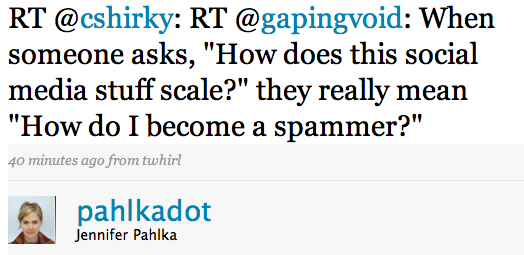I wrote this as part of a grant application in 2004 I think. Maybe 2005. There’s a phrase in here I come back to again and again to describe what is missing in many situations and what I’m looking to change, the intimacy I want to make and the conditions for it I want us all to make and have:
There’s is a big difference between a strip club and sexual intimacy. I think we’re after the business difference too. How often are pr/ SEC filings, marketing and branding and advertising an exercise in stripping? Even when showing everything, allowing in/exchanging nothing.
Thanks to Tony Comstock for pulling this bit out and inspiring me to think that perhaps it’s worth sharing all of this. I’d love to hear your thoughts.
(one small note: I plan to bring the Heather Gold Show back as subvert with heather gold sometime this year. If you’re interested in working on producing the podcast let me know.)
There is no audience.
Interactive performance
Is one way to describe what I do. Other terms I’ve used include freestyle comedy, story DJ, interactive comedy, and human filter. It’s tough mapping language to experience and feeling.
I use personal storytelling, humour, improvisation, conversation, communal activity and other techniques to create a relatively quick sense of intimacy and connection in the room. In traditional theatre the story is the means. I’m exploring ways to make it the end as well, so that the catharsis is not somewhere over there on stage but inside of everyone in the room. What if the performance were not about someone who is a baker, but is unfolding as I bake with everyone right now?
This entails adapting to the audience and encouraging their participation and energy as a factor in the show. It means spending as much time designing conditions likely to create a live experience as it does scripting. It also means being as genuine and authentically ones self as possible. There are a host of little tricks and techniques I’m learning as this path unfolds. For example, I’ve found that if I “go first†it makes it much easier for others to open up as well. This authenticity means means being imperfect. In public.
The business world more than any other has, sometimes silently and sometimes in memos, asked us to leave our whole selves outside the door and bring only the “efficient†piece of our minds to the task at hand. It takes a whole person, especially the ungraphed and un-Powerpointed parts of our humanity to have fun, to play, to be open. Those things are necessary for real community and creativity to occur.
From The Law Project proposal for my next solo show
Because I write the show by improvising with an audience, I cannot know the threads that will be strongest and remain at the end of the process. My work aims to create live, intimate community by exploring universal subjects that connect us. My interactive plays create community through the performance: To use humour, personal storytelling, and most of all the audience themselves to create a deep sense of connection and inclusion. Unlike most stand-up comics or audience participation shows, I never make comedy at the expense of the audience. I create a space for them to shine.
In Cookie I bake chocolate chip cookies with the audience. In The Law Project I plan to teach law with the audience as I explore my own journey through law school. This will increase the challenge intellectually and emotionally for me as a playwright and performer, as I work to find a way to make the abstract tangible and the theoretical emotionally resonant.
I write by talking / improving and riffing in a long series of workshops that always involve some kind of audience. Cookie was the result of many performances, and I’m interested in creating experiences that challenge folks as well as bring them together.
The commons is shrinking quickly in this nation, with conversations, academic and otherwise, happening more and more between folks who already agree with each other, listening to more of what they already think. Performance (and the law) have the opportunity to strengthen bonds as they can bring folks together who are di”erent, or already in disagreement. “Creating the space” has everything to do with whether or not we’ll truly be able to explore disagreement, or just talk at each other.
I think that the rule of law needs to be seriously examined in a moment in which western cultures believe that it is what makes them unique, better and free . What does rule of law really mean? Is it as powerful as story or is it the arena in which we craft and choose which stories we will collectively live by?
My work builds on the solo performance tradition created by monologist Spalding Gray. Like Josh Kornbluth, who built on Spalding Gray’s work, I use improvisation to create a play that feels alive. But my work focuses on bringing the form to a place that excites today’s audiences. This means building in interactive threads and moments. This means not locking the script completely. This means involving the audience very literally in the show. Video games, then music and now television are all involving interactive elements in part because people are interested in each other. Performance has always been a way of having a unifying collective experience. I’ve been taking elements and principles I learned from a variety of worlds, including the Net and applying them to live performance. And its an ongoing lesson. I try to approach performance like software. I don’t expect it to be completely finished and I know that I will learn something new from the audience every time.
Live performance has an opportunity to do what our Congress, towns and perhaps our real courts are failing to do: Be a public space in we can be whole together. This is theatre as new commons.
From The Heather Gold Show – my live talk show
I don’t force the specific topic of the show but let it grow organically from my lead guest (Thinker/represents light). I believe that passion is a requirement for a meaningful conversation, and that everything is like a wheel: if you can introduce any idea from the hub, then it will connect with any spoke. To curate guests, I choose people who will be able to give very different takes on the same subject, from the Entertainer (represents wine) and Doer (represents bread). These guests are always extremely diverse in terms of background, identity and point of view, but the topic, atmosphere, humour and vulnerability I share and connections I make allow all the guests and audience to come together. This means the show is about living the questions with the guests and everyone there.
From Open Source Management or Live! Corporate! Blogging!
There’s is a big difference between a strip club and sexual intimacy. I think we’re after the business difference too. How often are pr/ SEC filings, marketing and branding and advertising an exercise in stripping? Even when showing everything, allowing in/exchanging nothing.
From Design for Conversation, my business talk/experience
Why do people who make interactive experiences and focus on relationship in their business, have conferences in which the only time people interact is in the halls? How do you design for conversation? What are the qualitative factors in allowing it to happen?
What opens people up? What assumptions am I working from?
• inclusion
• everyone is welcome
• other people are funny
• its great if other folks get laughs too
• story is how we create meaning
• anyone can tell a story in the right conditions
• everyone is interesting when they’re present / authentic
• vulnerability is necessary for connection
• reaching the people on the edge will have an energetic domino effect on everyone else.
I welcome your thoughts and feelings.
Update 4/6/2013 Many thanks to BoingBoing for linking to this post in connection with the production of my interactive show “I Look Like An Egg, but I Identify As A Cookie” 4/8 and 4/9/2013 at Shotgun Players in Berkeley. Tickets for that are here. I learned a great deal of this stuff in making “Cookie.” Since I initially wrote this post I’ve done a fair amount of speaking and some workshop teaching and speaking coaching and a podcast related to how to create the conditions for conversation or “tummelling.” If you’re interested the workshop and talks at Google and Web 2.0 and Ignite, you’ll find much of it here. The podcast is called TummelVision and was done with Deb Schultz and Kevin Marks. It’s here.

